Blog
A mind blowing visit to Evergreen State College — a multi-authored report
In January 2018, with a contingent of 7 UU colleagues, we went to visit Evergreen State College — a LAS college in Olympia (Washington). You can find the reports that each of us has written here below.
Innovative education
Evergreen State College counts 3700 undergrads and offers a kind of education that might strike one as both paradoxical and wonderful, by coupling honours elements —interdisciplinary teaching, individual attention, ample opportunity for individual projects and for transdisciplinary work, e.g. the sustainability in prisons project— with 97% acceptance rate.
The initiative for this trip was taken by professor Michael Burke, Honours dean of UU Honours College. He met dr. Trevor Speller, Curriculum Dean at Evergreen State College earlier in the Netherlands during the National Honours Conference in Zwolle in the summer of 2017. At the conference Trevor Speller organized a workshop on innovative teaching and academic excellence at Evergreen, attended by Michael Burke and Chiara Robbiano. Learning that all courses at Evergreen are inter or multidisciplinary, that there are no departments, no requirements and no grades made a deep impression on us.
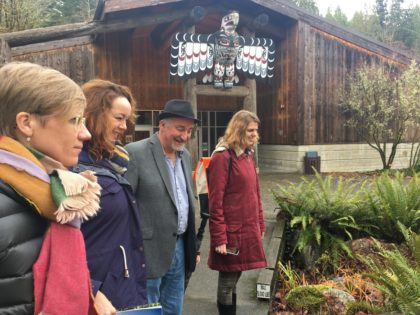
At Evergreen, they are very keen on ensuring both rigour and support. They definitely do wonders about support —from strategies to welcome any kind of diversity to children day care for students-parents, from evening and weekend classes to anxiety-relief animals. But can they ensure an excellent academic experience to all? We all went with different expectations and even more questions: How does a ‘radically interdisciplinary curriculum’ look like? What does it entail from teaching and policy perspectives? And how does such a thing work out for students at a state college?
All 7 of us were embedded in different courses, some of us as observer, some had a more active role as guest speaker. This gave us as a group a great opportunity to get the most out of this relatively short visit. The discussions over dinner led to new questions, on which we could focus on during the next day sessions.
A mind blowing visit
Chiara Robbiano: As honours director of UCU, I have especially asked myself: what about rigour? Do the best students receive enough stimulation or must the teachers keep the level low enough for everyone to tag along? I was embedded in ‘Born into Language’. It is an extremely ambitious and well-structured interdisciplinary course on psychoanalysis, philosophy, creative writing and sound art. One of the most striking features of this course was the variety of teaching and learning strategies students were exposed to. In only one and a half day, they attended two lectures (one lectures on Freud for which they had to read two texts; one guest lecture by me called “Ancient Eastern and Western philosophers on words that create worlds”); they submitted and discussed their essays and “response essays” in pairs; they participated to a creative writing workshop in groups of 5, for which they had prepared by reading: The Sandman by Hoffman, the contribution of 4 class mates, a “Close Reading Guide” and a “Feedback Guide”). I asked Kathleen, one of the two co-teachers where she learned so many different teaching techniques. She did not hesitate: after 10 years of co-teaching every term with different colleagues, it is very easy to build up a database of successful techniques!
First take home lesson: co-teaching is the best source of best practices and the best professionalization strategy.
Back to my question about rigour and stimulation of the best students. All students at Evergreen are constantly actively engaged with the course content and need to work on skills, some of which they might not master yet: in fact, it is not obvious that skilled writers are also proficient in psychoanalysis or that philosophy experts can translate a quote from a short story in prose into Shakespearean English or into a police report. How good are they in close reading? Can they give feedback to their peers? Quite interestingly we were told by the Provost that, when hiring, Evergreen makes sure that their teachers are skilled in teaching writing. Students who graduate from Evergreen will definitely be able to communicate, orally and in writing, across any kind of difference.
At Evergreen they have no grades, but narrative evaluations. Teachers offer three feedback and narrative assessment moments per course in which they discuss their progress with students individually. Students, at the end of the course, are asked to write a narrative self-evaluation, to be discussed together with the teachers’ last narrative assessment.
Second take home lesson: content courses are the right place where, not only feedback from the teachers is in place, but also student reflections on their own progress should be stimulated, tutorial advise should be given and a conversation should be offered on the next step in the student’s curriculum. This great deal of individual attention is another element of Honours Teaching for everyone in perfect Evergreen spirit.
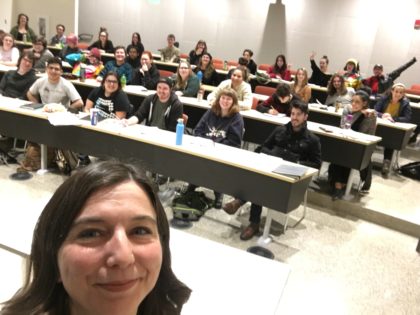
Iris van der Tuin: As the Director of the School of Liberal Arts in the Faculty of Humanities at Utrecht University, a directorship that comes with responsibilities for Language and Culture Studies (‘TCS’) and Liberal Arts and Science (LAS), I was expecting to learn a lot as both a director of education and as an educator. I was hoping to encounter smart policies and effective and surprising classroom methods. I could not wait to meet the students. The visit to Evergreen State has been mind-blowing and I am sure that it will continue to resonate in the years to come. It has been interesting to find out how the interdisciplinary courses–courses co-taught across the disciplines–have a 2,5 year incubation period and how most of them are developed from the bottom up, that is, by the faculty itself. This implies the necessity for Evergreen to be a close community. The ephemeral nature of most courses (they happen only once) gives them momentum for both teachers and students. I see myself implementing such a strategy especially in settings of theme-based interdisciplinarity. The fact that the students can also sign individual contracts with staff for deep(er) learning makes for an interesting mix that I am interested in exploring further with my colleagues and for our students. Given that LAS students are infrastructurally smart (they know how to navigate an educational institution), I cannot wait to send them to Evergreen.
On day one we were invited on a campus tour so as to be able to experience the rainforest, the native American longhouse, the organic farm, and the more regular college buildings. Nothing about those buildings is regular, by the way, because they have no names (the So-and-So building of Discipline X), only numbers or indications of their cross-disciplinary use (e.g. Seminar I and II). This transversal built environment also hosts farm and longhouse, and of course the cafeteria and sports center. For me, the most puzzling experience at Evergreen centers around food: I am still reflecting on the disjunctions between organic food production, the meal plan, fast food, and a foodbank, all on the same campus. I am hoping to inspire LAS students to do research on food (in)security on US campuses one day. The experience that made the most impression from a policy perspective has been the composition of the team of Deans. No disciplinary Deans, but Deans of Admissions, Internationalization, Library and Resources, Curriculum, and Deans Groups and Planning Units for fields of study.
I was embedded in a course titled ‘Reproduction: Gender, Race, Power’, a year-long course on the intersections of public health and medicine, gender and critical race studies, humanities, and law. Both the brown-bag lunch before class and the in-class experience have made me aware of a truly generous Evergreen spirit. Students and staff were welcoming and inviting, happy to answer my questions, and curious about Utrecht University, The Netherlands, and Europe. They were teaching enthusiasts, keen learners, and serious (emerging) scholars. It has been a valuable experience to both socialize, experience a mind-blowing talk by an intersex activist, and exchange references to scholarly material. The ‘Trans-Atlantic Dis-Connection’ in critical scholarship and pedagogy was surely bridged and I cannot wait to welcome staff and students to our own university.
Sabine Uijl: As Director of Education of UCU, I wondered most about the quality assurance for educational as well as assessment.
I was embedded in the course ‘What are schools for?’, a co-production of two close friends (neighbors and friends for over 30 years), an anthropologist and a scholarly primary school teacher, who co-taught together for the first time. The energy and vibe between the teachers was very lively and positive, which reflected to the students. Overall, the atmosphere at Evergreen State College was very relaxed and positive. I spoke to a lot of students, who explained that not having the pressure of grades liberated them and motivated them to learn in ways other colleges they attended have failed to achieve. One of my worries was the quality assurance, which is hard to control, when courses are taught only once (or twice) ever and the assessment consists of narrative evaluations. Indeed, we found out that Evergreen was struggling getting a sustainable formal quality assurance system in place. Not that we noticed that the quality of the education worrisome; the system of co-teaching provides for a form of quality assurance in itself, with 2 people working together during the whole process, from brainstorming about the development of the course to providing feedback on the narrative evaluations.
In line with that, I see Evergreen State College as a very interesting example of interdisciplinarity. I do see options for a faculty exchange between Evergreen and UCU teachers, where we could learn a lot from their approach to interdisciplinarity.
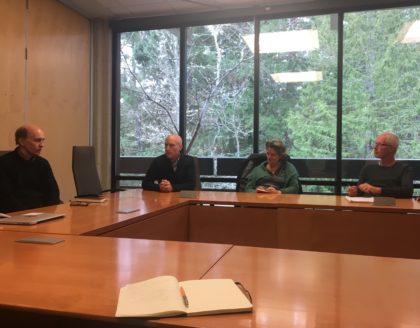
Charlotte Brand: as the coordinator of the UU Honours College, I was curious if the Evergreenway of co-teaching really worked in practice and I was hoping that I could pick up some elements that we could use in our honours programmes or even create a new honours programme like the courses in Evergreen . I was embedded in the course Seeds of Change, a co-production between Prita Lal, with a background in Sociology and Alice Nelson, who had a background in Latin American Studies and Spanish. The course was about the origin of foods. How was it grown, cultivated and harvested? But there were also more social questions like do we all have the same access to food and how has the migration of workers to harvest food, as well as their movements for social justice, created new forms of culture and from protest songs? The students were working in small groups on an assignment and presented it later. In the afternoon we saw a very interesting movie called First Daughter of the Black Snake about one women’s quest against a pipeline company threatening her tribe’s land and their wild rice beds. The film was about the access of food but it was also a movie about political action, social justice and the role of tribes in the United States. Afterwards we discussed the film. First in small student groups and afterwards there was a whole group discussion. The groups also wrote a group process student self-reflection about how their group did function that day. The reflection was about the strengths and weaknesses of each group member and aspects they could improve next time. The teachers were very enthusiastic and really easy to access. They told me that co-teaching really benefits their own work as a teacher. They are developing and creating new skills every single day. One day we had field trips to a Community Garden and a Food Bank in Olympia. We met several people and also worked in the gardens and helped at the food bank. It was really useful for the students to see the daily practice after reading literature and having several lectures.
We all are inspired and do see options for a interfaculty exchange between Evergreen and UU students and teachers. We gained such a lot of ideas and learning methods that the UU Honours College is set to work, together with the UU colleagues who travelled with us, on a new interdisciplinary and interfacultary honoursprogramme. And I am really convinced that co-teaching can work in Utrecht as it works in Evergreen.
Michael Burke, UU Honours Dean:
“At Evergreen State College, we have no departments, no tracks, no required courses and no grades …. We consider all of these to be hindrances to learning.”
This was the opening pitch delivered by three lecturers from Evergreen State College, who were running a workshop into what was “deep interdisciplinarity” in Zwolle ahead of the National Honours Conference. The workshop was about how teachers from two completely different fields, in this case English literature and biology, can come together and form a single course that involves everything that they would normally have in their standard course, while selecting readings and articles together that connected the two disciplines. The one colleague was an expert in English poetry and the other in forest ecology. They found, for example, that “genre” was a concept shared in both fields and from there they progressed, discussing, negotiating and planning. I was hooked. I decided in my role as UU Honours Dean to share what I had experienced and invited a number of UU colleagues from within the university (mainly education directors and honours directors) to come with me to visit Evergreen State College in Washington State, USA. Curriculum Dean at Evergreen, Dr. Trevor Speller, helped us to become imbedded in one of the courses that was running before we left and we all had the opportunity to email with the teachers on our courses to see what we could bring into the mix.
I was embedded in a course called On Liking. The teachers on the course were an anthropologist, a historian, and a teacher of photography from a local arts college. My background is in linguistics and rhetoric. The course took in everything, from novels, to psychoanalysis, to science, to neuroscience. I decided to offer some lectures and workshops about liking in the field of rhetoric. For this, I focused on one of Aristotle’s three intrinsic proofs ,namely, ethos (argument by character) – the other two are logos and pathos – and I made a transition from classical rhetoric via psychology into everyday marketing: in essence “how being liked gets things done”. It was great fun and the students were exceptional. I came away inspired with a plan. The UU Honours College is a space for pedagogical experimentation. I will pitch an “Evergreen in Utrecht” session at the forthcoming Onderwijsparade next month; find six colleagues who want to try this out; build two courses of “deep interdisciplinarity”; get co-creative student input; launch them at the start of the 2019-2020 academic year; test them and tweak them; expand the programme and then hopefully see the model seep into the regular programmes in the university – spreading like a benevolent, pedagogical oil slick. For this is what honours education is all about.
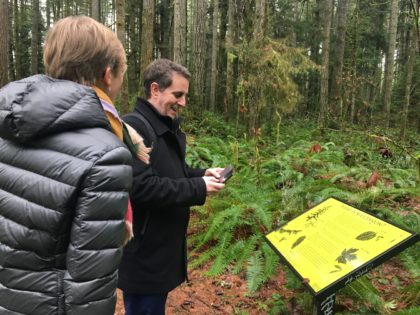
Arjen Vredenberg, Science Honours Director & Head of Science, UCU:
Before our visit I had heard a lot about Evergreen, mostly in very positive, even admiring ways. I had visited Evergreen’s website multiple times, and was struck by letting go of strict curriculum planning and rules, and rather start from expectation principles that guide academic planning, both for students as well as staff. I was eager to witness how this works in practice, and hear from students, staff and management how to navigate a system that is in continuous and sometimes turbulent motion. It was interesting to notice how easy, or even natural, it seems to be to make connections across widely differing disciplines, and defining themes and contexts to bridge surprising combinations. The bottom-up approach, combined with 2,5 year development period, are essential, as well as the strong community of scholars, all on the same mission. I have not thought this through but my guess is that the size of Evergreen, 4000 students with a staff of approximately 200, is close to ideal to maintain a continuous overturn of courses, offering the full breadth across all disciplines, without overburdening faculty. Courses are often full-time (i.e. a student is in one course at a time) and stretch across a full semester or even a whole year. This implies that disciplinary depth in certain subject areas is reached. Even so, I had my concerns about how to maintain coherency in such a fluid system, but I was also assured that with careful large team planning such coherency issues can be resolved. In fact, and a bit to my relief, I found out that in the Natural Sciences, many more recurring courses had to be defined, in order to enable students to achieve advanced levels, which would prepare them to enter specific graduate programs.
I participated in the course Forensics and Criminal Behavior, taught by a criminologist and a molecular cell biologist. I was struck by the interaction of the two in class, as well as the ease with which the students integrated knowledge and skills from different topic areas (e.g. a physico-chemical blood spatter analysis and a crime scene investigation) within one class session.
Margien Bootsma: As Honours director of the faculty of Geosciences and programme leader of the interdisciplinary BSc programme Global Sustainability Science, I was curious to experience the interdisciplinary team teaching and narrative assessment methods of Evergreen.
I was embedded in the half-year long course “Introduction to Environmental Studies: River Resources”, co-taught by a geologist and an economist. The sessions in which I participated showed that this team teaching is very inspiring, for students as well as teachers. The setting of the course – fulltime, for students as well as for teachers – allows both teachers to be present, interact and learn during all classes, enhancing the interdisciplinary learning experience. The class size is small – maximum 25 students per teacher, so this course had 50 participating students, resulting in a strong community. The diversity of the student group is great. The assessment practice at Evergreen – narrative evaluation instead of grading – takes away the GPA-pressure and competition between students and it stimulates self-reflection of students. These narrative evaluations can be quite extensive. They include evaluations of the student by the teacher, self-reflection of the student and an evaluation of the faculty by the student. And, most important, students discuss the evaluation with their teacher. Next to these evaluations, students write an academic statement, summarizing and reflecting what they learned. I feel that the Evergreen approach to interdisciplinary teaching and assessment could be of great value for us, especially since they are well aligned with the goals and vision of our Honours programme.
 Nice to know for Geo’s: meet Evergreen mascot: Speedy the Geoduck! “Nothing is quite as it seems when it comes to the geoduck.”
Nice to know for Geo’s: meet Evergreen mascot: Speedy the Geoduck! “Nothing is quite as it seems when it comes to the geoduck.”
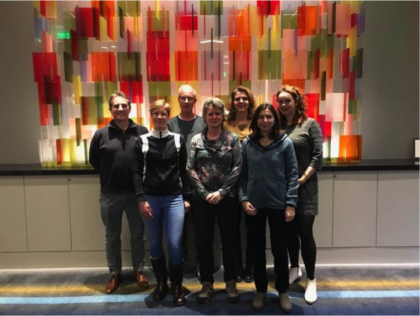
Michael Burke, UU Honours dean, Arjen Vredenberg, Honours director Science, Sabine Uijl, director of Education at UCU, Charlotte Brand, Coordinator at UU Honours College, Iris van der Tuin, director of the School of Liberal Arts in the Faculty of Humanities, Margien Bootsma, Honours director Geosciences and Chiara Robbiano, Honours director at UCU
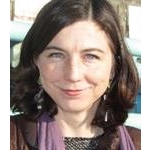 23 februari 2018
23 februari 2018
U moet ingelogd zijn om te reageren, gebruik het formulier aan de linkerkant om in te loggen met uw solis gegevens.


